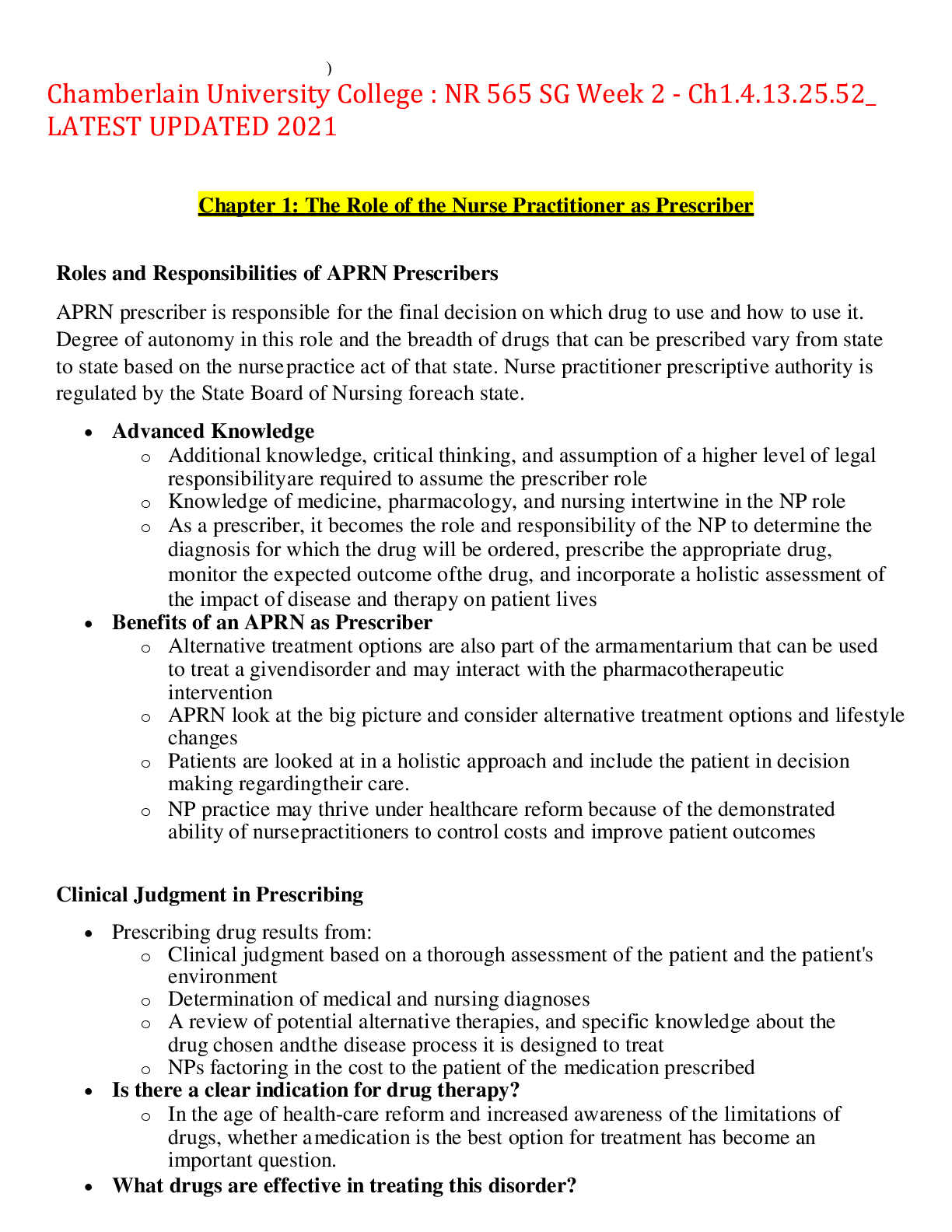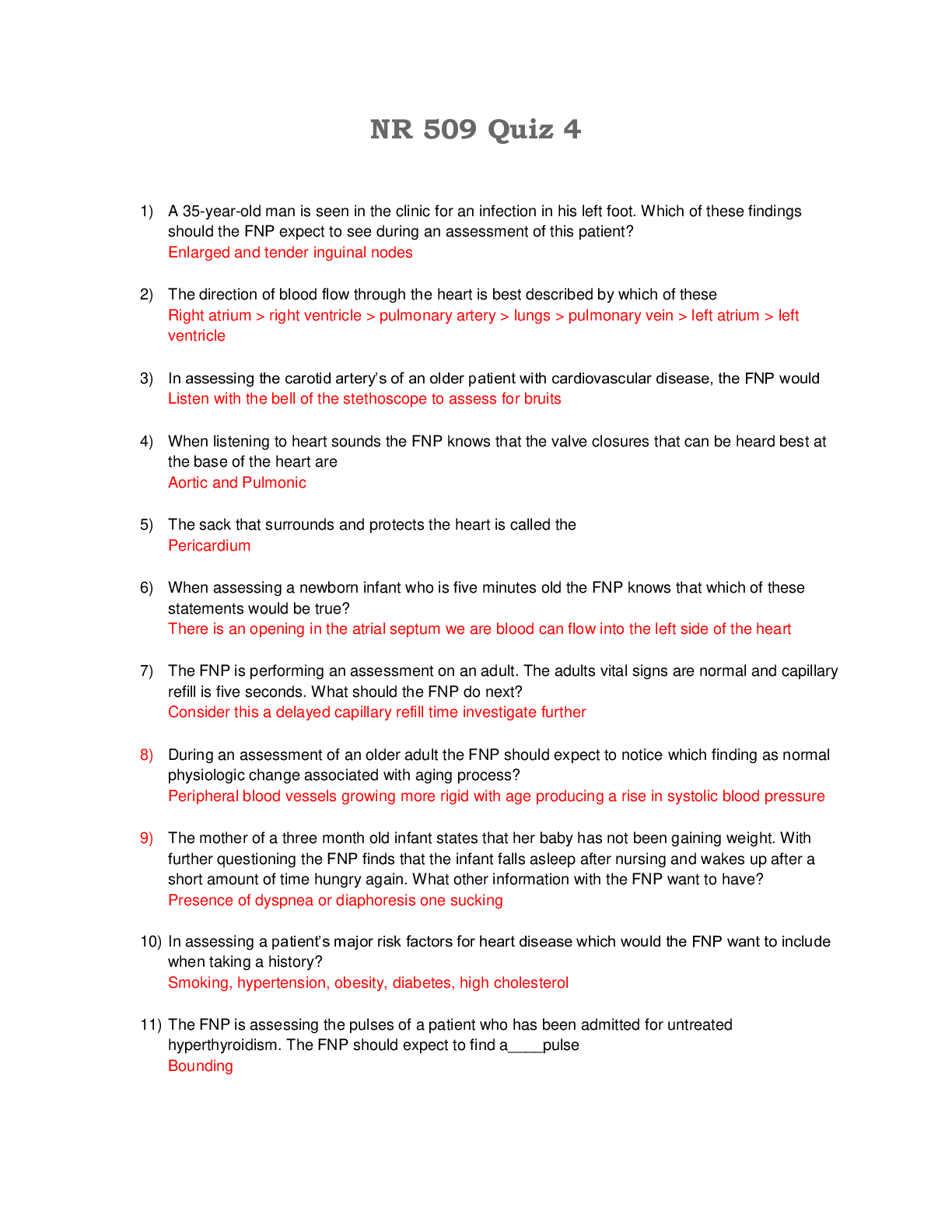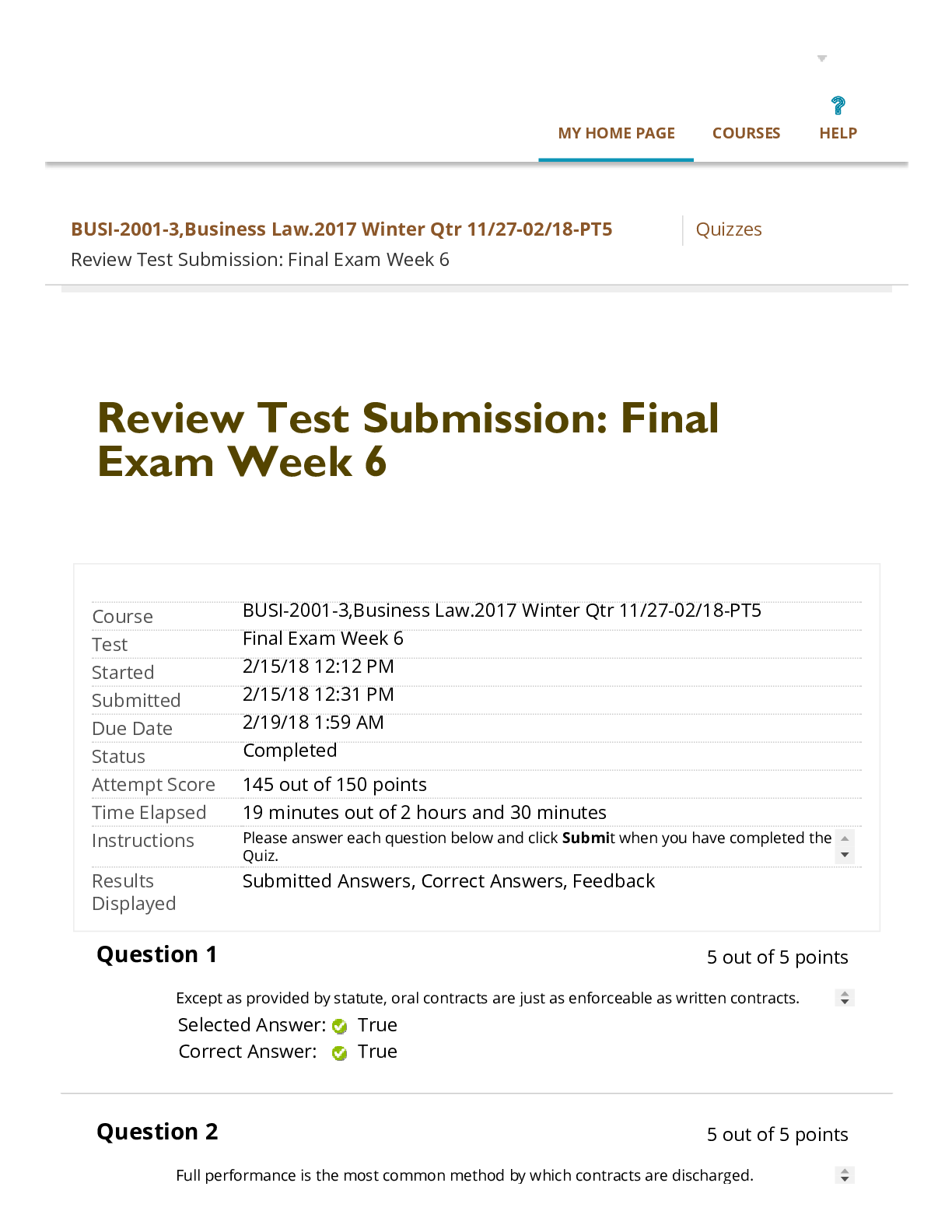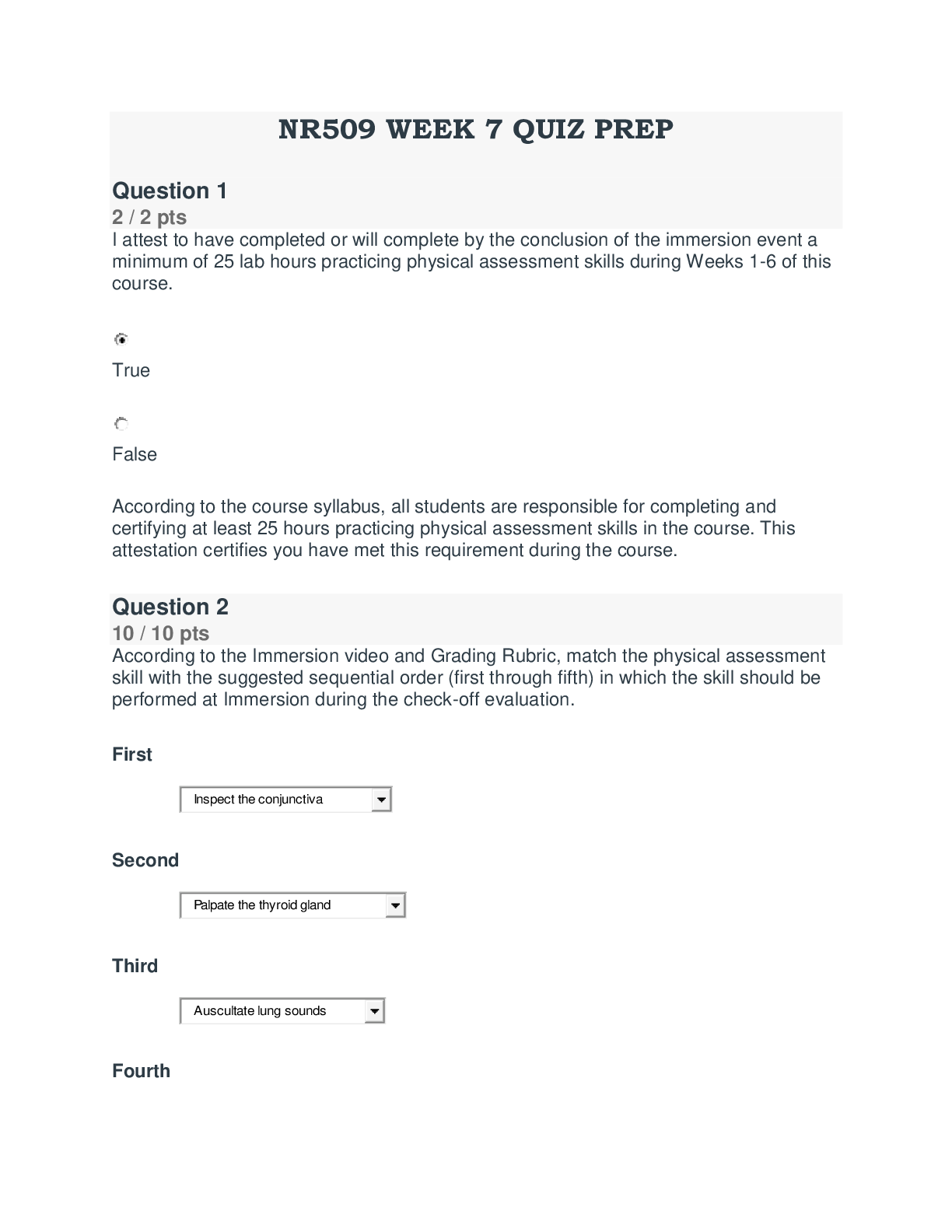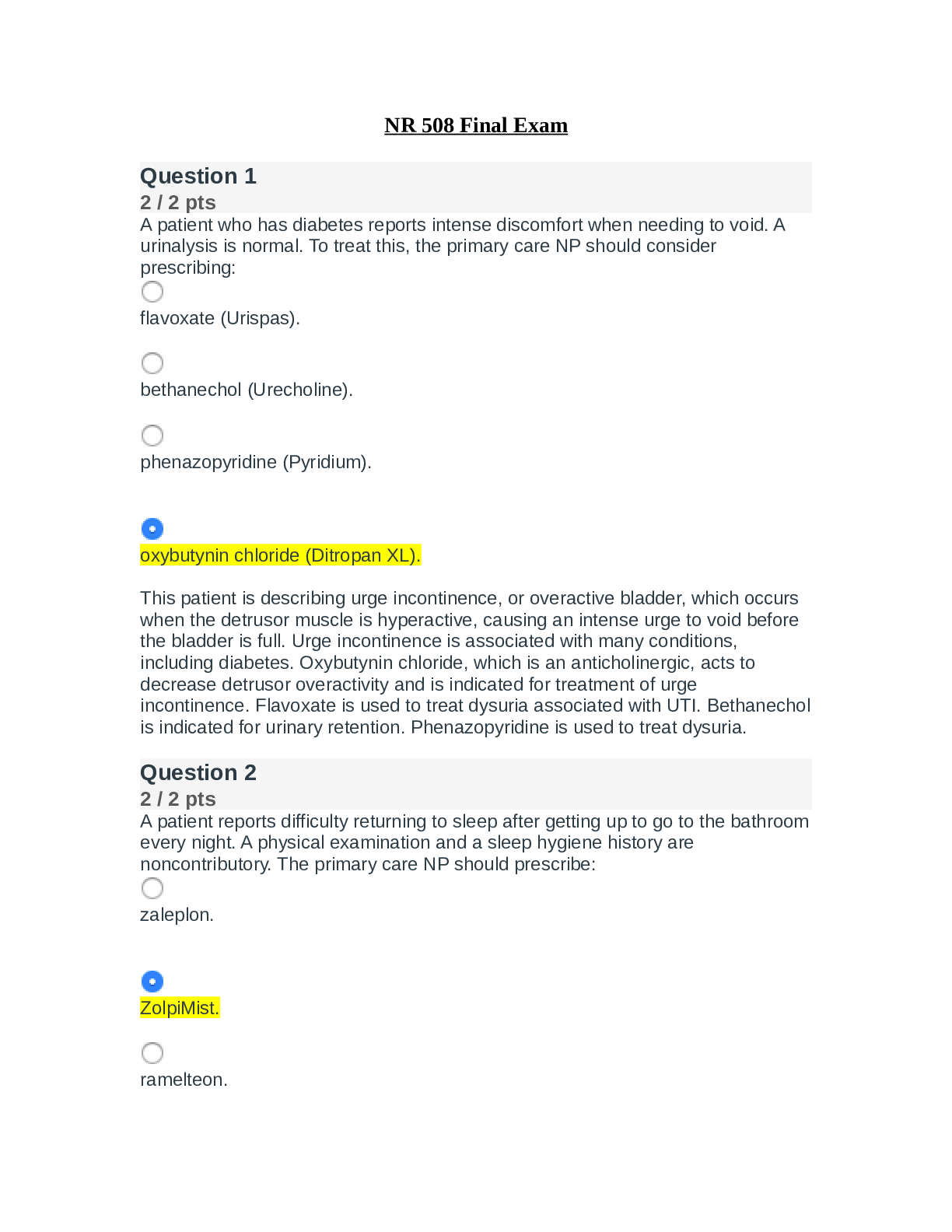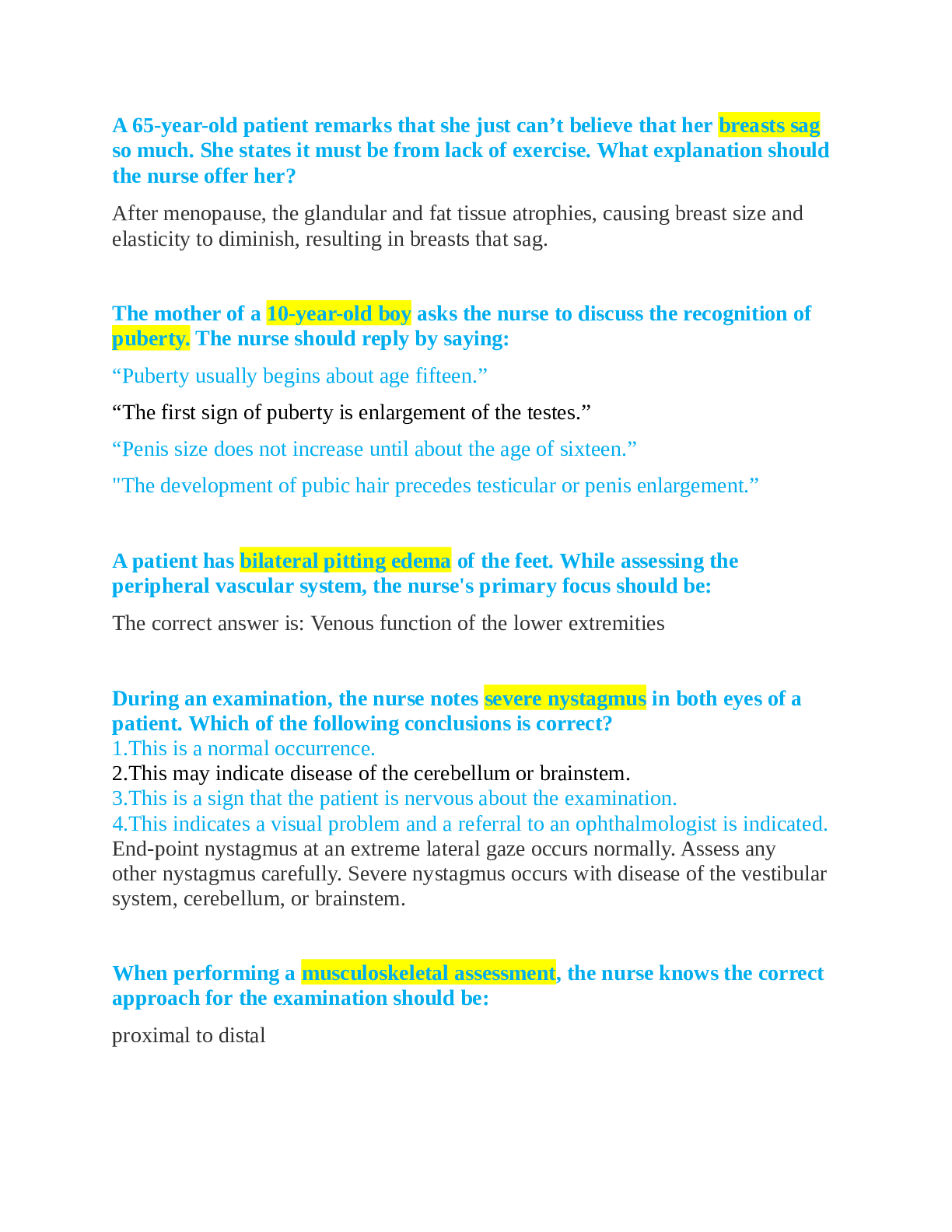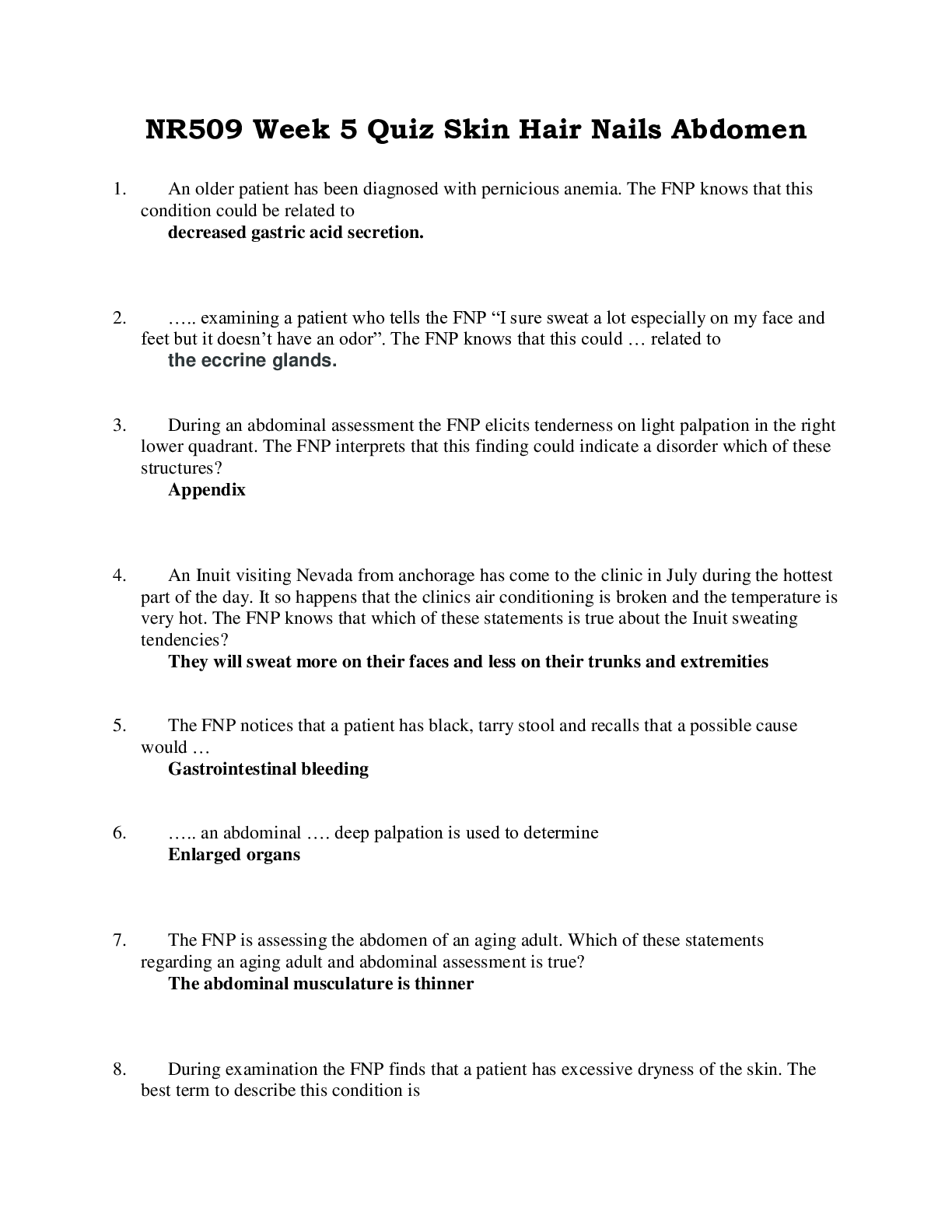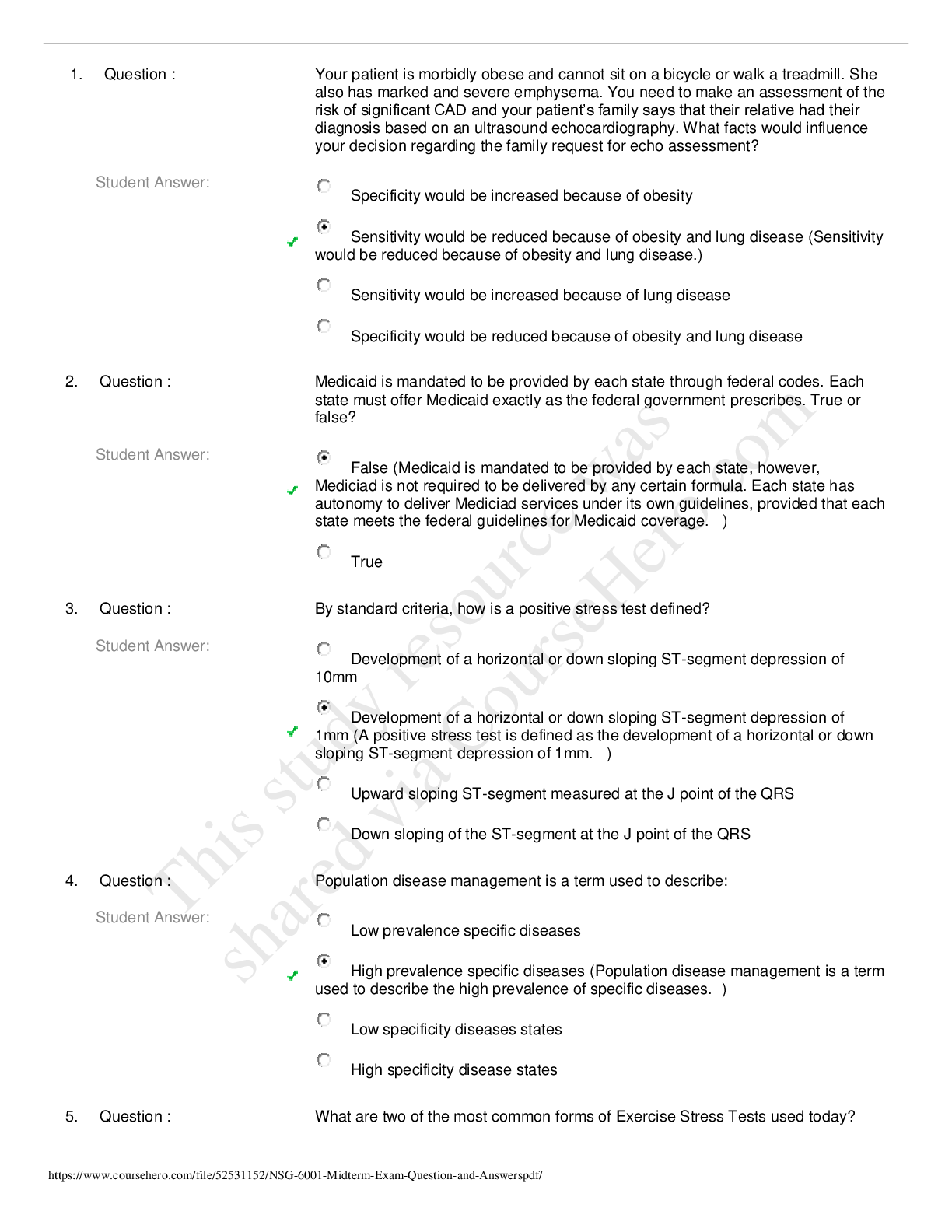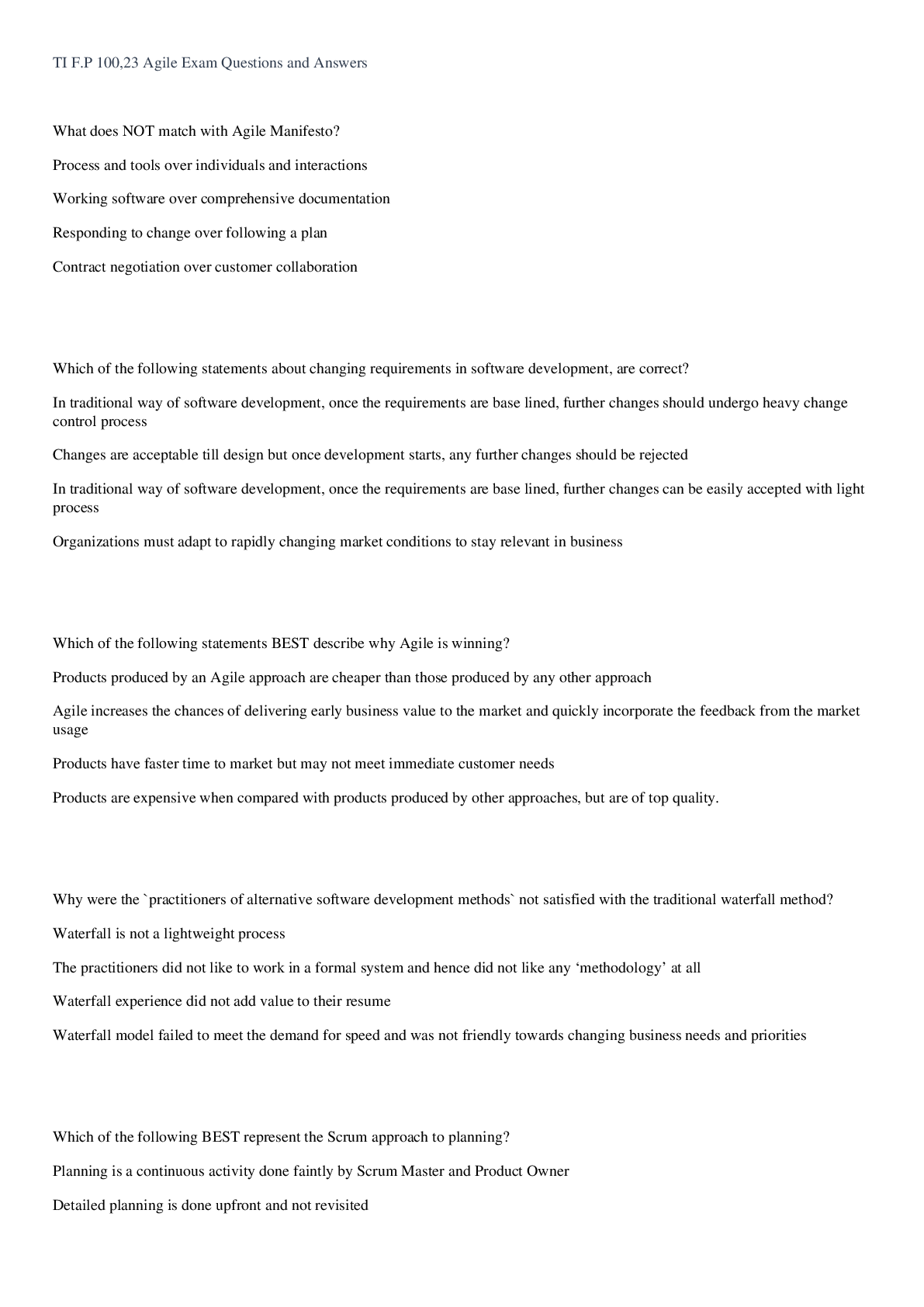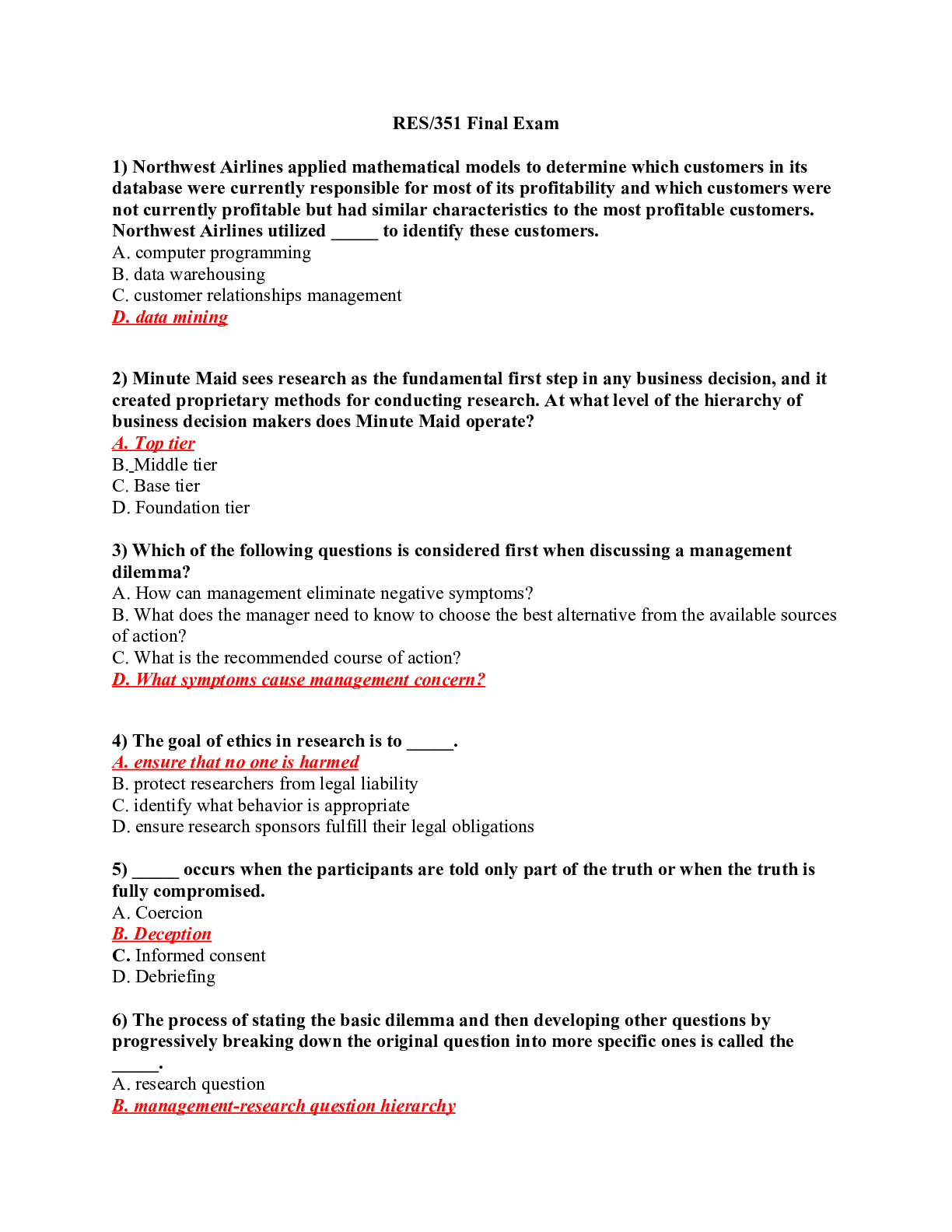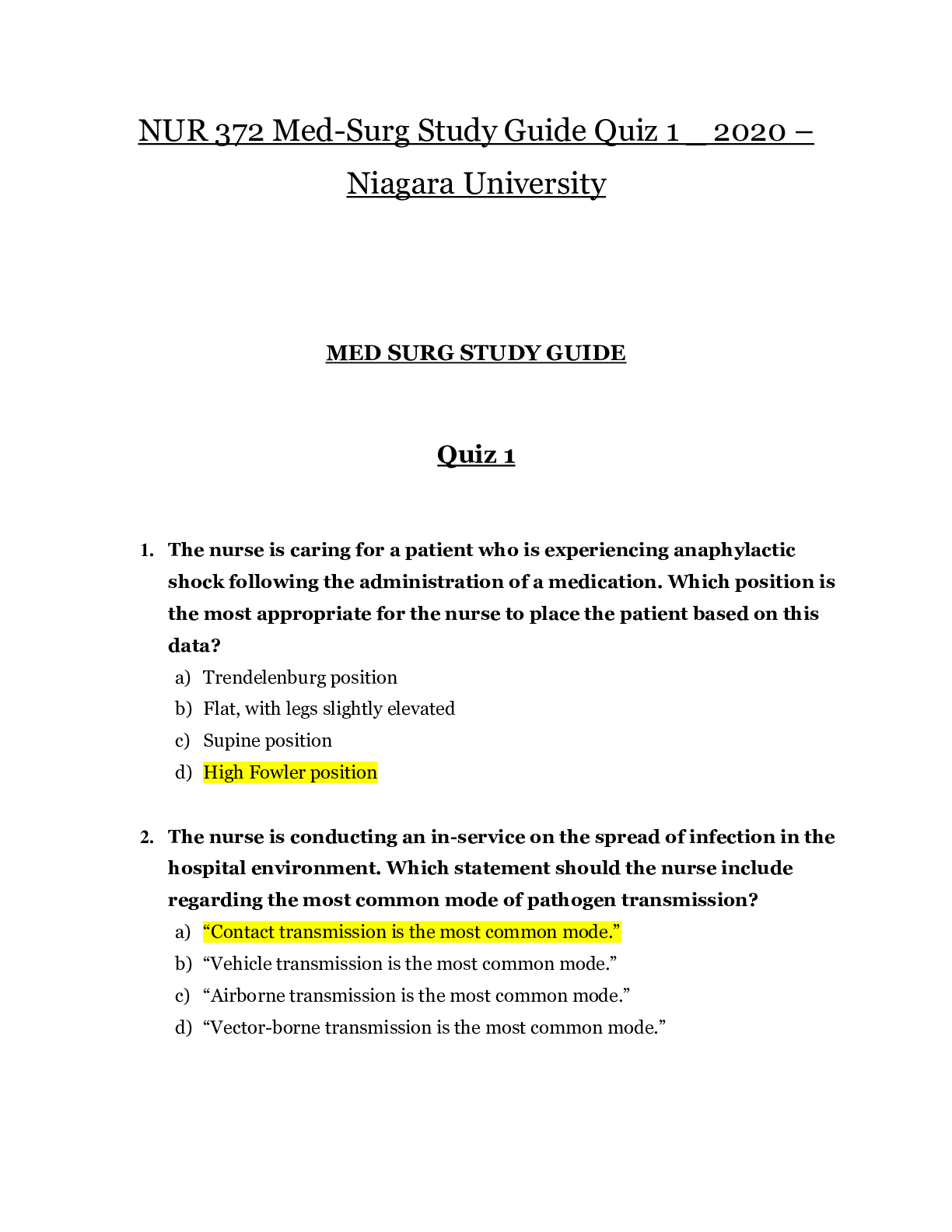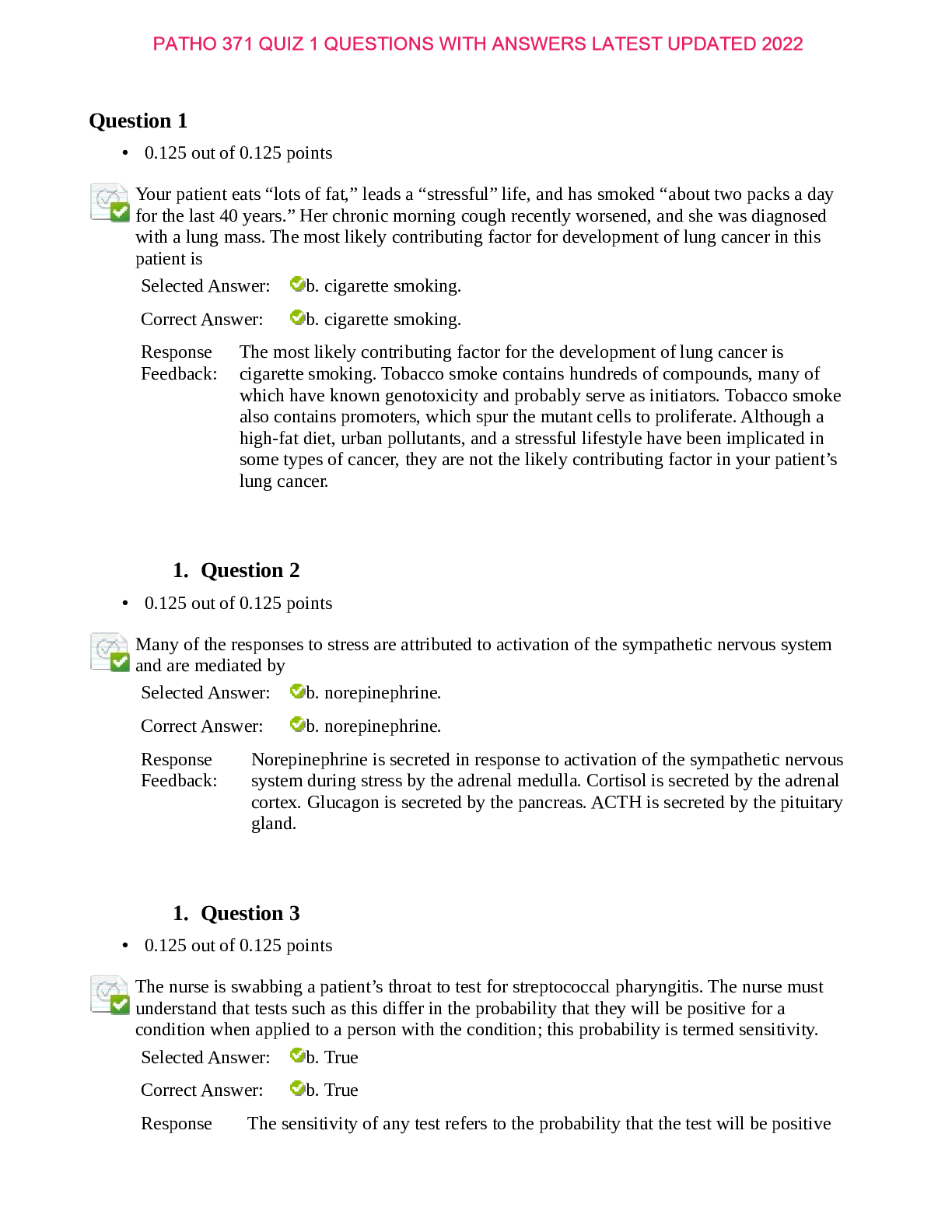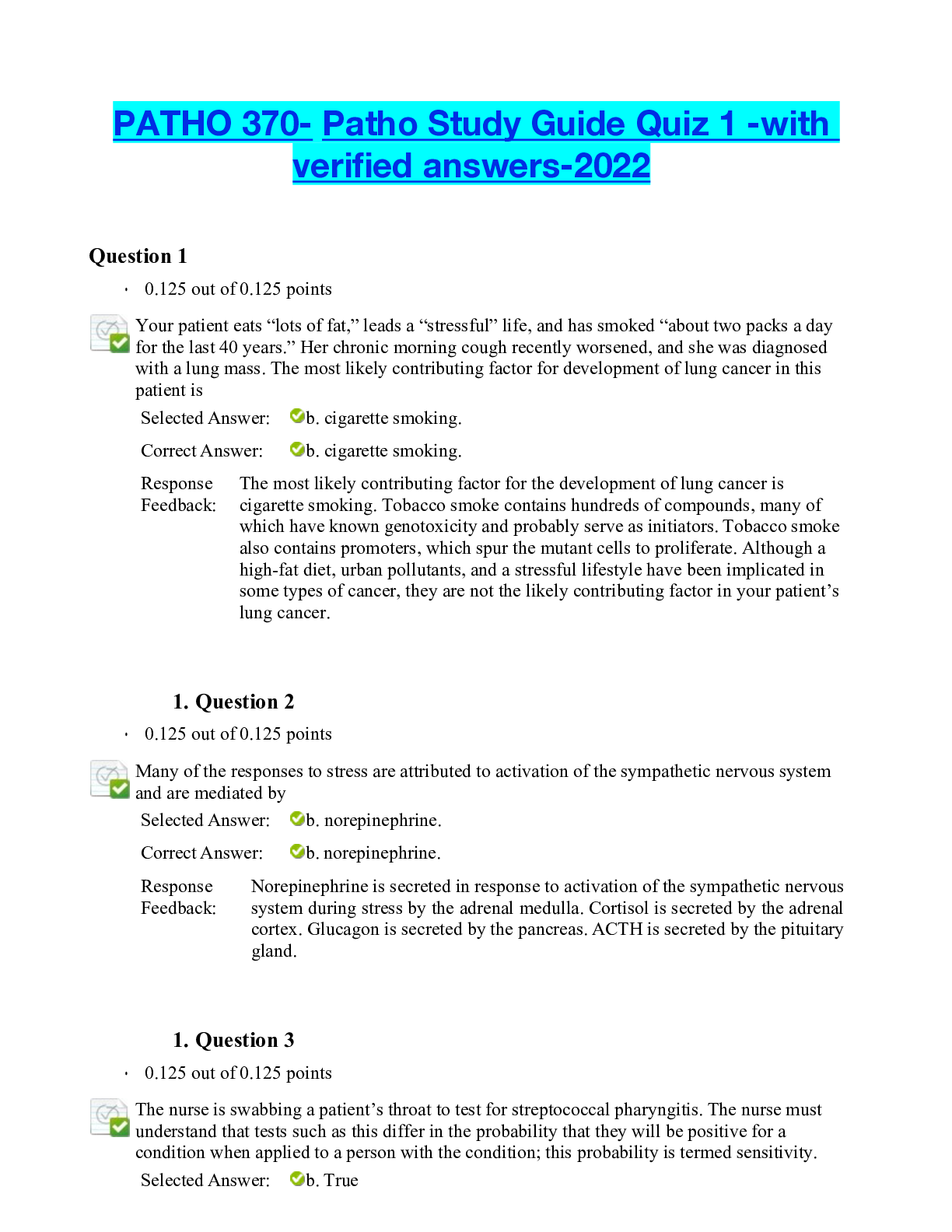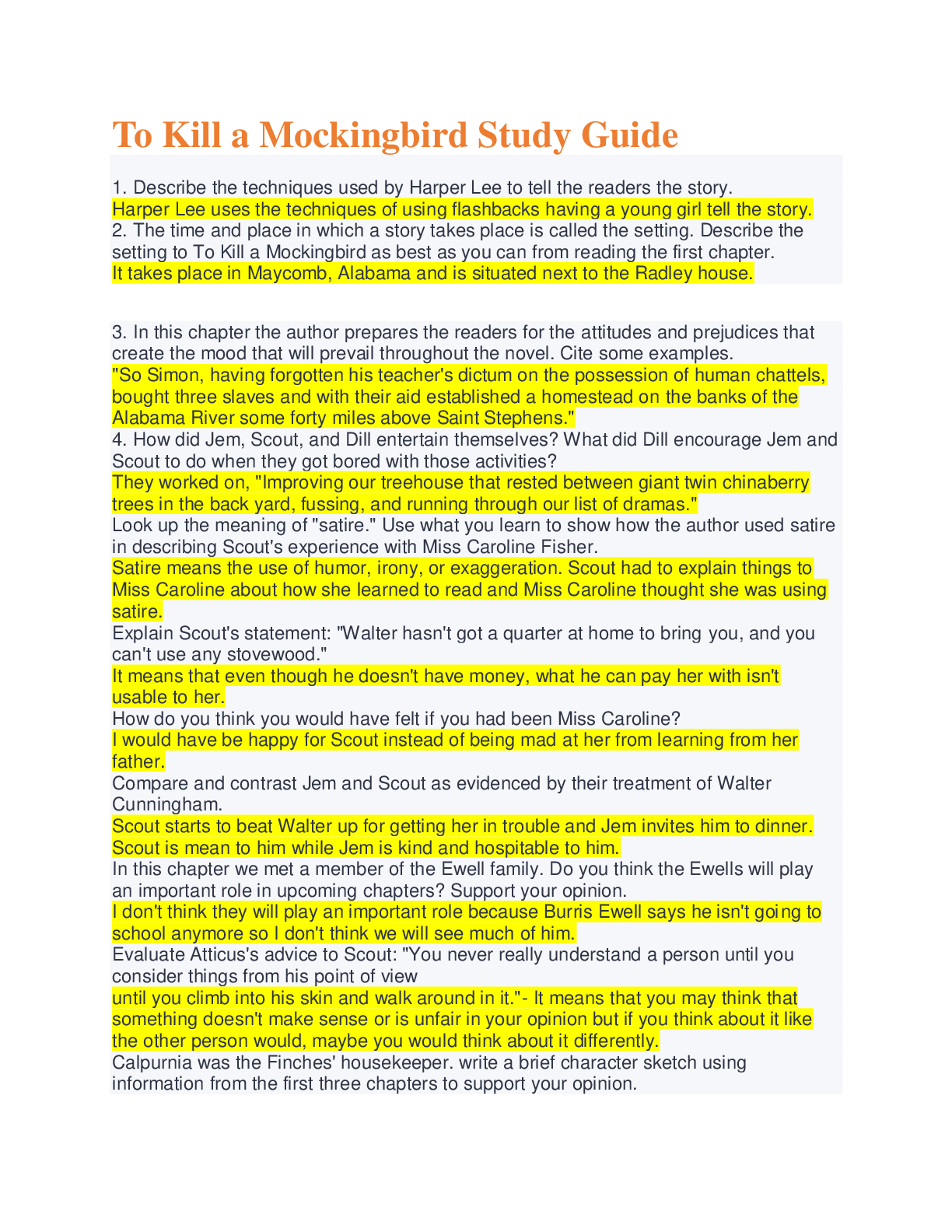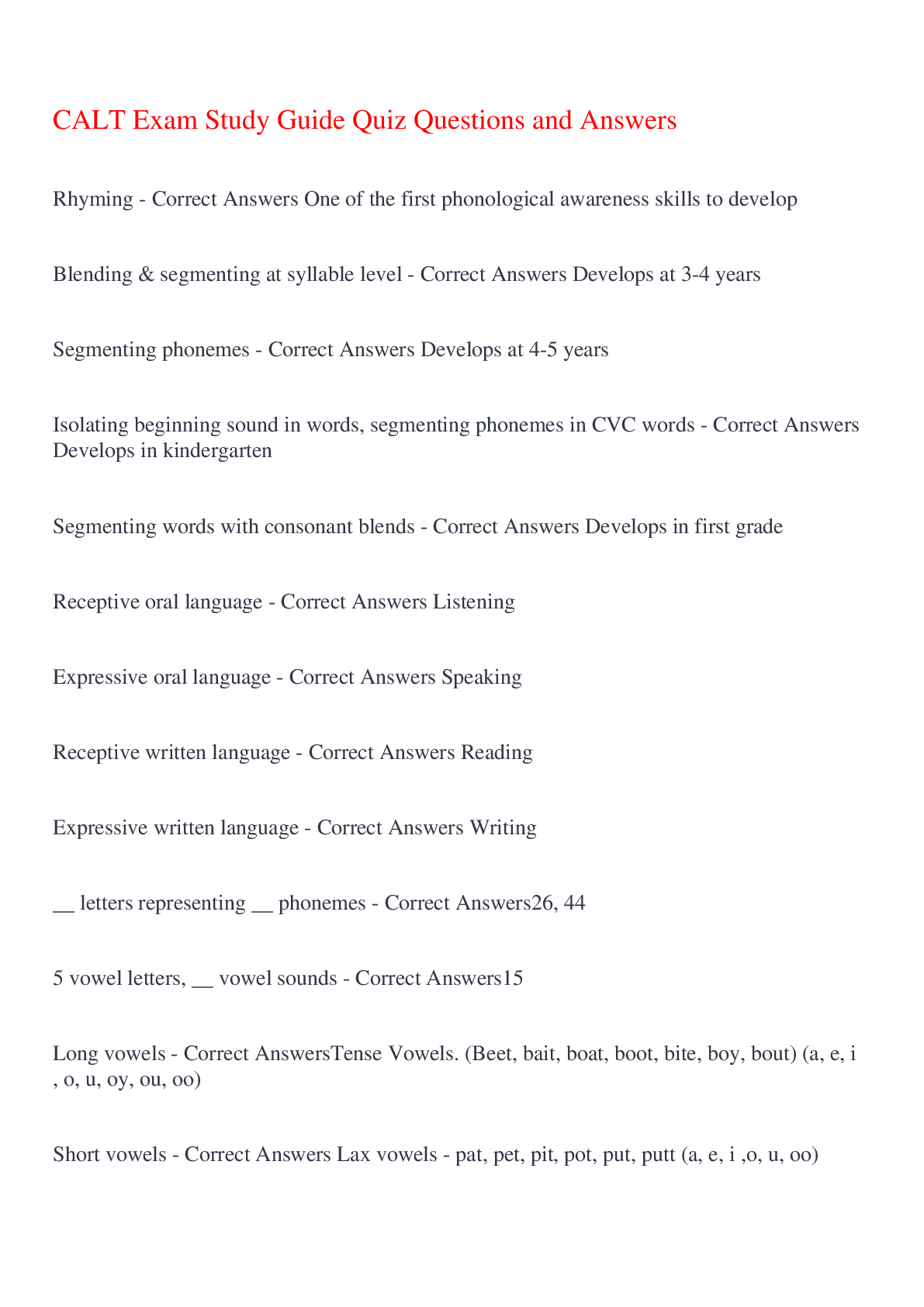Pathophysiology > EXAM > NR-507-Advanced Pathophysiology Study Guide Quiz 2-Week 2 (All)
NR-507-Advanced Pathophysiology Study Guide Quiz 2-Week 2
Document Content and Description Below
NR-507-Advanced Pathophysiology Study Guide Quiz 2-Week 2 NR-507-Advanced Pathophysiology Study Guide Quiz 2-Week 2 1. Question Fluid & Electrolytes Differentiate between normal the balance m... ovement of water & solutes between ICF & ECF = isovolemia . regulation of water balance- hypothalamic , pituitary, adrenal cortical , renal , cardiac, gastrointestinal regulation, insensible water loss. Abnormal cellular- changes in solute levels of ICF & ECF, Hypovolemia- ECF has lower osmolality than ICF which draws water INTO the cell causing cellular swelling & plasma volume decrease. Immune structure Function – body fluids functional compartments ICF (%40 of body weight) & ECF (%20 body weight) moving by osmosis. Intrvascular (IV) – blood plasma (<5 %), interstitial fluid (IF) fluid between the cells & outside blood vessels ( <15 % , other fluids lymph, synovial, CSF, intestinal, sweat, urine, intraocular, & body cavity fluids= 3 spaces ALL fluids in the body are called TBW, body temp regulation, lubrication (synovium, pleura & pericardium Fluids – normal, contracted & exp&ed Electrolytes- isotonic, hypertonic & hypotonic Values of electrolytes Sodium- 135-145 Potassium 3.5 -5 Chloride 106-106 Calcium 9-11 Bun 10-20 creatine 0.7- 1.2 Co2 (bicarb) 22-26 Magnesium 1.5-2.5 2. Question Fluid & Electrolytes Dehydration The excretion of ketone bodies results in loss of water & electrolytes Explore age-specific- Loss of fluids from diarrhea can represent a significant proportion of body weight in infants. Renal mechanisms that regulate fluid & electrolyte conservation may not be mature enough to counter the losses, so dehydration can develop rapidly. developmental alterations in cellular ematous fluid accumulates, it is trapped in a “third space” (i.e., the interstitial space) & dehydration can develop as a result of this sequestering of fluid. Such sequestration immune processes- increased sodium (hypernatremia) ICF, water deficit ICF, Hyperglycemia ICF 3. Question Fluid & Electrolytes Analyze pathophysiologic mechanisms associated with alterations in cellular immune function 4. Question Fluid & Electrolytes Dehydration Analyze pathophysiologic mechanisms associated with alterations in cellularimmune function- Marked water deficit is manifested by symptoms of dehydration: headache, thirst, dry skin & mucous membranes, weight loss, decreased urine output, & concentrated urine (with the exception of diabetes insipidus). Skin turgor may be normal or decreased. Symptoms of hypovolemia, including tachycardia, weak pulses, & postural hypotension, may be present. Water deficit, or hypertonic dehydration, can be caused by lack of access to water, pure water losses, hyperventilation, arid climates, or increased renal clearance. 5. Question Fluid & Electrolytes kidneys- filter electrolytes from the blood, Chronic Renal Failure Relate pathophysiological alterations in cellular chronic renal failure pruritus is phosphate deposits in the skin, Decreased renal excretion of potassium is commonly associated with hyperkalemia. Renal failure that results in oliguria (urine output <30 ml/hr) is accompanied by elevations of serum K+ concentration. The severity of hyperkalemia is related to the severity of renal dysfunction, the amount of K+ intake, & the degree of acidosis from the renal failure. immune processes to the development slower rises associated with chronic renal failure. cute or chronic renal failure with significant loss of glomerular filtration; treatment of metastatic tumors with chemotherapy that releases large amounts of phosphate into serum; long-term use of laxatives or enemas containing phosphates; hypoparathyroidism diagnosis hronic renal failure (a condition in which almost all affected individuals are anemic) treatment of select health problems 6. Question Fluid & Electrolytes Relate pathophysiological alterations in cellular immune processes to the development diagnosis treatment of select health problems. Acid/Base Disturbances in fluid & electrolyte or acid-base balance are common & can be life threatening. The respiratory system regulates acid-base balance by controlling the rate of ventilation when there is metabolic acidosis or alkalosis. 7. Question Differentiate between normal Phosphate acts as an intracellular & extracellular anion buffer in the regulation of acid-base balance; in the form of ATP it provides energy for muscle contraction. The lungs, kidneys, & bone are the major organs involved in the regulation of acid-basebalance. The systems are interrelated & work together to regulate short- or long-term changes in acid-base status. abnormal cellular immune structure & function. odium is important in other body functions, including maintenance of neuromuscular irritability for conduction of nerve impulses (in conjunction with potassium & calcium), regulation of acid-base balance (through sodium bicarbonate & sodium phosphate), participation in cellular chemical reactions, & transport of substances across the cellular membrane8. Question Acid/Base Metabolic Alkalosis- systemic increase in H+ concentration or decrease in bicarbonate (base) Differentiate between normal increased CNS responsiveness dizziness, cramping, agitation, seizure abnormal cellular- high blood PH & elevation of HCO3- cause excessive loss of metabolic acids, vomiting, gi suction, excessive intake of alkaline drugs (antacids) immune structure compensation hypoventilation to decrease CO2 release. function. 9. Question Acid/Base Renal Failure- kidneys- filter electrolytes from the blood, Relate pathophysiological alterations in cellular- n acute renal failure K+ levels rise more rapidly with more serious consequences. cute or chronic renal failure with significant loss of glomerular filtration; treatment of metastatic tumors with chemotherapy that releases large amounts of phosphate into serum; long-term use of laxatives or enemas containing phosphates; hypoparathyroidism immune processes to the development diagnosis treatment of select health problems. Acute renal failure, severe congestive heart failure, & cirrhosis are clinical conditions that can precipitate water excess. Decreased urine formation from renal disease or decreased renal blood flow contributes to water excess 10. Question Acid/Base Metabolic Acidosis- systemic increase in H + concentration or increase in bicarbonate (base) Analyze pathophysiologic mechanisms associated with alterations in cellular- decreased CNS responsiveness, headache, confusion, lethargy, coma immune function- causes loss of bicarbonate from intestine, diarrhea, decreased excreation of H+, renal failure excessive production of nonvolatile acids- ketosis due to exercise, DM, hypoxia, starvation, ingestion of exogenous acid- drugs, poisons. Compensation hyperventilation to increase CO2 release Chamberlain College of Nursing NR-507-Advanced Pathophysiology Study Guide Quiz 2-Week 2 Concepts: Alterations in Acid/Base; Fluid & Electrolytes Concept Disease Couse Objective Weekly Objective Fluid & Electrolytes N/A Analyze pathophysiological mechanisms associated with select disease states. Differentiate between normal & abnormal cellular & immune structure & function. Fluid & Electrolytes Dehydration Distinguish risk factors associated with selected disease states. Explore agespecific & developmentalalterations in cellular & immune processes. Concept Disease Couse Objective Weekly Objective Fluid & Electrolytes N/A Analyze pathophysiological mechanisms associated with select disease states. Analyze pathophysiologic mechanisms associated with alterations in cellular & immune function. Fluid & Electrolytes Dehydration Analyze pathophysiological mechanisms associated with select disease states. Analyze pathophysiologic mechanisms associated with alterations in cellular & immune function. Fluid & Electrolytes Chronic Renal Failure Integrate advanced pathophysiological concepts in the diagnosis & treatment of health problems in selected populations. Relate pathophysiological alterations in cellular & immune processes to the development, diagnosis & treatment of select health problems. Concept Disease Couse Objective Weekly Objective Fluid & Electrolytes N/A Integrate advanced pathophysiological concepts in the diagnosis & treatment of health problems in selected populations. Relate pathophysiological alterations in cellular & immune processes to the development, diagnosis & treatment of select health problems. Acid/Base N/A Analyze pathophysiological mechanisms associated with select disease states. Differentiate between normal & abnormal cellular & immune structure & function. Acid/Base Metabolic Alkalosis Analyze pathophysiological mechanisms associated with select disease states. Differentiate between normal & abnormal cellular & immune structure & function.Concept Disease Couse Objective Weekly Objective Acid/Base Renal Failure Integrate advanced pathophysiological concepts in the diagnosis & treatment of health problems in selected populations. Relate pathophysiological alterations in cellular & immune processes to the development, diagnosis & treatment of select \ [Show More]
Last updated: 1 year ago
Preview 1 out of 5 pages
Instant download
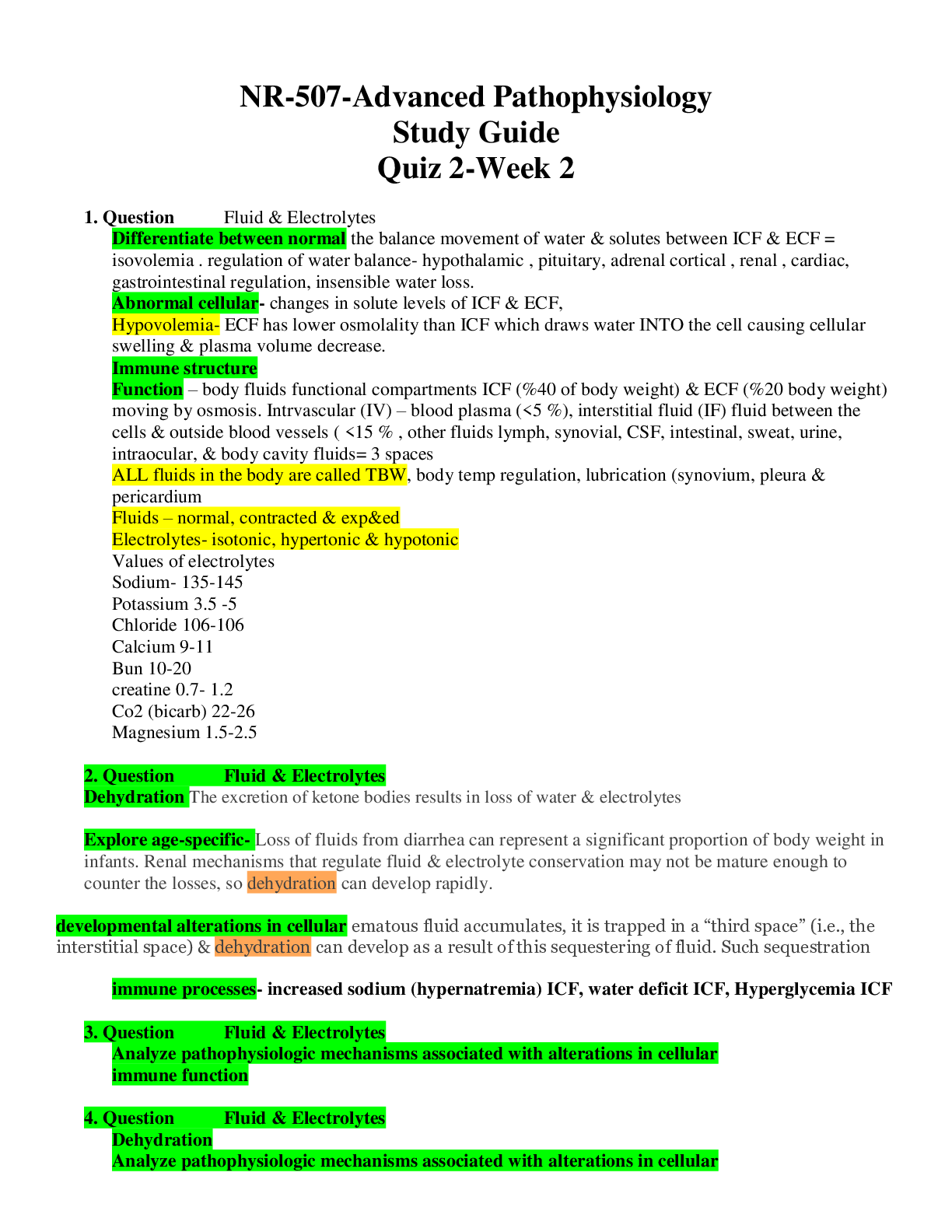
Buy this document to get the full access instantly
Instant Download Access after purchase
Add to cartInstant download
Reviews( 0 )
Document information
Connected school, study & course
About the document
Uploaded On
Mar 03, 2022
Number of pages
5
Written in
Additional information
This document has been written for:
Uploaded
Mar 03, 2022
Downloads
0
Views
71


